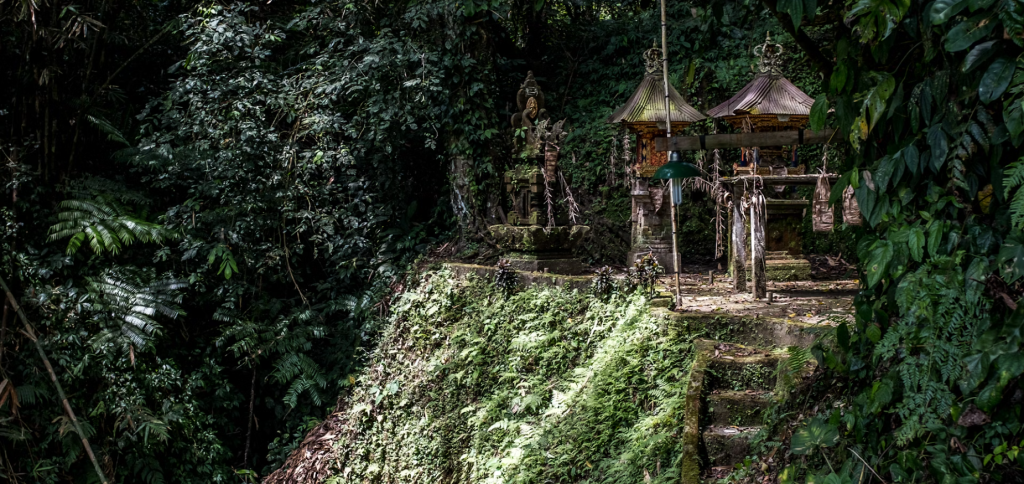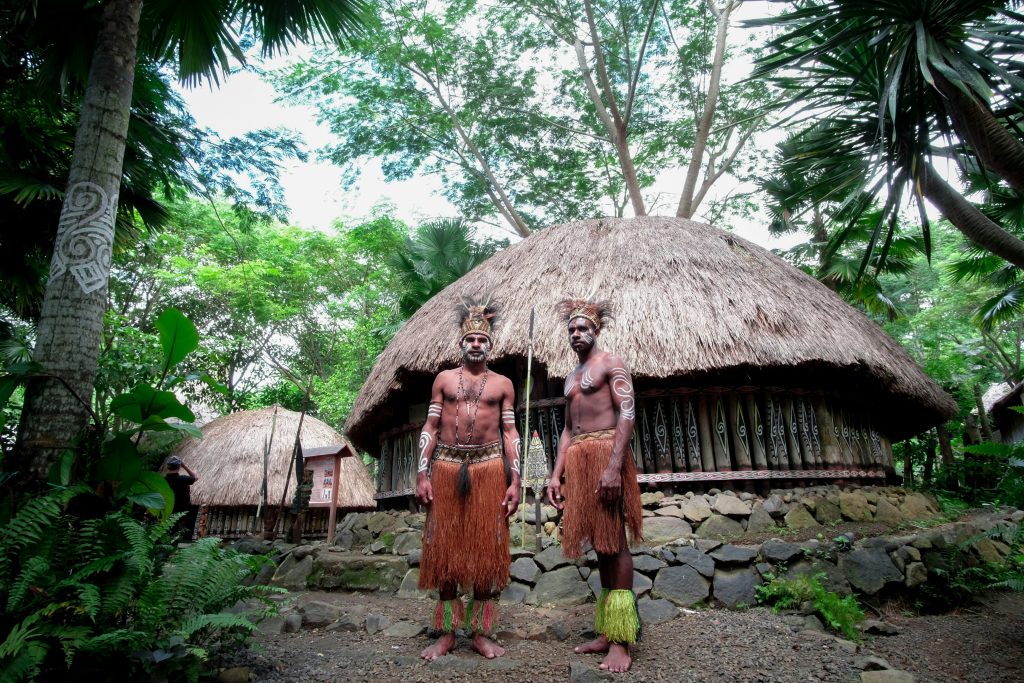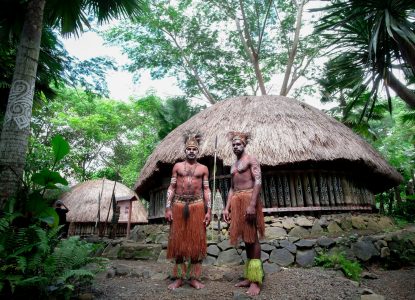By Marianna Richardson
As part of the Belem Conference, a session was held focusing on the connection between protecting religious heritage and strengthening communities. Moderated by Nicholas Miller and Romana Remor, this session brought together diverse voices to discuss the challenges faced by indigenous and traditional communities in preserving their sacred sites and practices, particularly in the context of the Amazon region and African-descended religions in Brazil. Key speakers included Ivanir dos Santos, who discussed challenges faced by practitioners of African spiritual practices; Christine Alves Bastos (Mam’etu Zaze Leuacy), who spoke about discrimination against people of African descent and their spiritual traditions; Pieter François, who presented on the timeline of conflict and religious heritage; and Mametu Nanguetu, who shared personal experiences of religious intolerance in Brazil. The discussion highlighted the urgent need for dialogue, understanding, and concrete actions to protect religious freedoms and sacred spaces, covering topics such as the importance of land to indigenous people, the preservation of natural elements in African spiritual practices, the connection between religious tension and societal cohesion, and the challenges faced by traditional religious practices in modern legal and social contexts.
– – –
Nicholas Miller and Romana Remor introduced the importance of the land to the indigenous people and stressed that the Amazon represented more than property to them. We face situations where there is conflict between protecting these sacred territories and economic power. We must learn how to share and compromise with federal and state governmental voices of power and decision-making. There is a cry for help and a sense of urgency from the people living in the Amazon. We rejoice in freedom, but we have many violations. We are seeing extreme polarization in cultures, which produces a huge challenge.

Ivanir dos Santos
Dos Santos, referenced the recent report by UNESCO that highlighted some of the issues we are talking about at this conference. The burning of sacred houses has drawn attention to other atrocities of African history and the need for a pluralistic dialogue. While we often talk about the importance of collective experiences, reciprocity is not always guaranteed. Practitioners of African spiritual practices are grateful for the opportunity to share their beliefs. These spiritual practices emphasize a different belief system—one deeply connected to the elements of earth, water, air, and fire. For them, preservation of these elements is inseparable from nature itself. However, legal challenges persist. Ordinary laws often criminalize their practices, leading to the confiscation of sacred objects and herbs. Despite these obstacles, there is a growing movement advocating for religious freedom, particularly through dialogue and campaigns involving diverse religious leaders.
In this context, African religions face unique challenges. While not organized in the same way as Abrahamic faiths, they grapple with noise-related laws that can hinder their practices. Unlike churches, which may face noise complaints but rarely legal prosecution, African practitioners find themselves silenced due to perceived noise levels. As the movement for religious freedom gains momentum, concrete efforts are underway. One such initiative involves a walk for religious freedom—a powerful demonstration of dialogue and solidarity. This campaign aims to amplify the voices of underrepresented religious leaders, including black priests and women pastors, who often feel discriminated against. Through this global channel, they hope to create a space for open conversation and understanding, bridging gaps that no other place in the world currently addresses in quite the same way.
Christine Alves Bastos (Mam’etu Zaze Leuacy)
Bastos, continued the discussion by reiterating that people of African descent continue to be targets of discrimination and violence in the name of religion. Our spiritual practices and traditions are deeply cherished and protected. For us, the protection of nature is not only an environmental concern but also an expression of our faith. We see ourselves as stewards of the land, teaching others about the delicate balance required for our community’s well-being.
Our spiritual spaces are places of welcome and assistance to those in need. We have a tradition of sharing food and resources, especially in a world where many people still do not have enough to eat. Public policies should prioritize the right to food and address other social issues to ensure the well-being of everyone.
Leaders play a crucial role in promoting social justice. International forums like the IF20 and G20 have an important role in the fight against poverty and environmental care. As citizens, we must remain vigilant against religious intolerance and racism. Despite our rich mosaic of beliefs and plurality, we still face intolerance, prejudice, discrimination, and violence. The freedom to share our ideas freely is often hindered.
Our shrines and sacred places, rooted in our African descent, are sometimes attacked. Our faith is frequently misunderstood, but we emphasize love, fairness, and democracy. Every act of intolerance leaves a bruise on the soul of humanity. I invite all of you to be change agents in individual lives, bridging cultural polarization and supporting nature. Christine ended her words as a mother who believes in the vital force that permeates everything, and it strengthens and inspires us to create a more compassionate world.
Pieter François
François, talked about the timeline of conflict and religious heritage. The destruction of religious heritage often occurs during periods of heightened tension and conflict. As conflicts escalate, sacred sites, artifacts, and traditions become vulnerable. This gloomy phase typically emerges as tensions build, and it can serve as an early indicator of broader societal strife. Indeed, religious tension can act as an early warning sign for larger, societal conflicts. By monitoring religious intolerance and tracking incidents related to heritage destruction, we may gain insights into societal fragility. Recognizing this connection allows us to address underlying issues before they escalate further.
Resilient societies withstand challenges more effectively. The key question lies in understanding the relationship between religious tension and societal cohesion. Cohesive societies tend to foster religious tolerance, while fragmented ones may experience intolerance. Thus, promoting social cohesion becomes crucial in preventing conflict. Innovative approaches involve studying the life cycle of societies. By examining how religious intolerance evolves over time, we can identify critical moments—the “Goldilocks” moments—when intervention is most effective. Given limited resources, pinpointing these moments becomes essential.
There are three key factors to consider:
- Religious Demography: Understanding the distribution of religious groups within a society.
- Existing Literature and Indexes: Leveraging research and metrics to measure religious tolerance.
- Societal Pressures: Analyzing how various societal forces interact and influence religious dynamics.
Collaboration, such as the partnership between Ivo functioning in the Brazilian government and the Federal University, plays a vital role. Sharing insights, conducting research, and engaging in dialogue are essential steps. Early actions, even small ones, can signal potential problems and guide preventive measures. Insights from these efforts can contribute to predictive models for religious violence. Heritage protection matters both locally and globally. When sacred sites or artifacts are targeted, it signals deeper societal issues.
Studying stories of heritage loss on an academic level helps us understand the impact and implications. By doing so, we can work toward a more tolerant, compassionate world—one where heritage thrives, even amid societal challenges.

Mametu Nanguetu
Nanguetu, pointed out that in Brazil, rich rituals are woven into the fabric of our lives. We reject the notion of demons within our African descent religions and harbor no secret messages. As priests, pastors, and adherents of all faiths, we embrace a culture of peace. However, our leaders have faced violence—some even losing their lives. When we seek assistance from federal ministries, our pleas often go unanswered. Recently, my own home, deemed a shrine, received a notice to close, which was an unsettling development. The mayor of Belem’s actions, pushing an unvoted bill, further dismayed me. We implore lawmakers to create laws for the people that support all people’s traditional, religious beliefs. After all, God’s presence is everywhere, and respect for one another should prevail.
As a shrine keeper, I seek help not only for my sacred space but for our collective faith. Our traditions vary, and while some may perceive us as relics of the past, we need a political and democratic conscience to protect our heritage. Unfortunately, I’ve faced hostility—stones thrown at me and my house. When our religious drums replaced clapping, neighbors hurled rocks. The city’s disrespect and intolerance persist. When we try to press charges for these unlawful acts, we’re met with dismissive responses, and the disrespect and physical abuse are labeled as mere neighborly disputes. But this is more than disputes, it is a fight against intolerance. That’s why I unite with others, not just within my shrine. Curiously, many religions escape taxation, yet we are not given the same equality. As part of a committee working with the police, I wonder: Why the eviction order on our shrine houses? Our shrines house the elderly, and this battle extends beyond my personal struggle. Perhaps it’s time we proudly don our traditional attire, bridging the gap between ancient practices and modern challenges. We can work together to change society.
After the panelist presentations, the meeting was opened for questions. The main question centered on issues of religious racism. We need to make sure that all incidents of violence because of religious racism are reported. People are losing their lives over this. There was a plea to talk to the Brazilian national congress to point out the killings. A report is being compiled to document all the cases of racism.
Finally, the moderators, Nick and Romanna, summarized the session by talking about three main points:
- Protecting Sacred Spaces: The issue of burning prayer houses and shrines is deeply concerning. These spaces hold not only religious significance but also touching stories and memories. It is essential that we move beyond disputes and recognize the legal and religious importance of these places. The religious world must unite to raise its collective voice against such destruction. When we protect these sites, we safeguard not just physical structures but also the spiritual connections they represent.
- Our Connection to Nature: Acknowledging our place within nature is crucial. In Western societies, we have often exploited nature rather than treating it with reverence. We need a functional approach—one that teaches stewardship over the land and treats it with dignity. By building together, we can create a harmonious balance where both human needs and the environment thrive. Our interconnectedness with nature transcends religious boundaries, emphasizing shared responsibility.
- Defining Religion and Embracing the Secular: The definition of religion varies across different groups. Rather than rigidly dividing the religious and the secular, we should recognize their interplay. If everything is considered religious, protection becomes complex. The secular is not an enemy; it is a vital component. The principle of “Render to Caesar what is Caesar’s and to God what is God’s” highlights this dual sphere. Respecting both realms will ensure a holistic approach. But how do we navigate this in religions that don’t neatly fit into predefined boxes? Perhaps it’s time to expand our understanding and find inclusive ways to safeguard diverse faiths.
– – –
Marianna Richardson is the Director of Communications for the G20 Interfaith Forum. She is also an adjunct professor at the Marriott School of Business at Brigham Young University.


